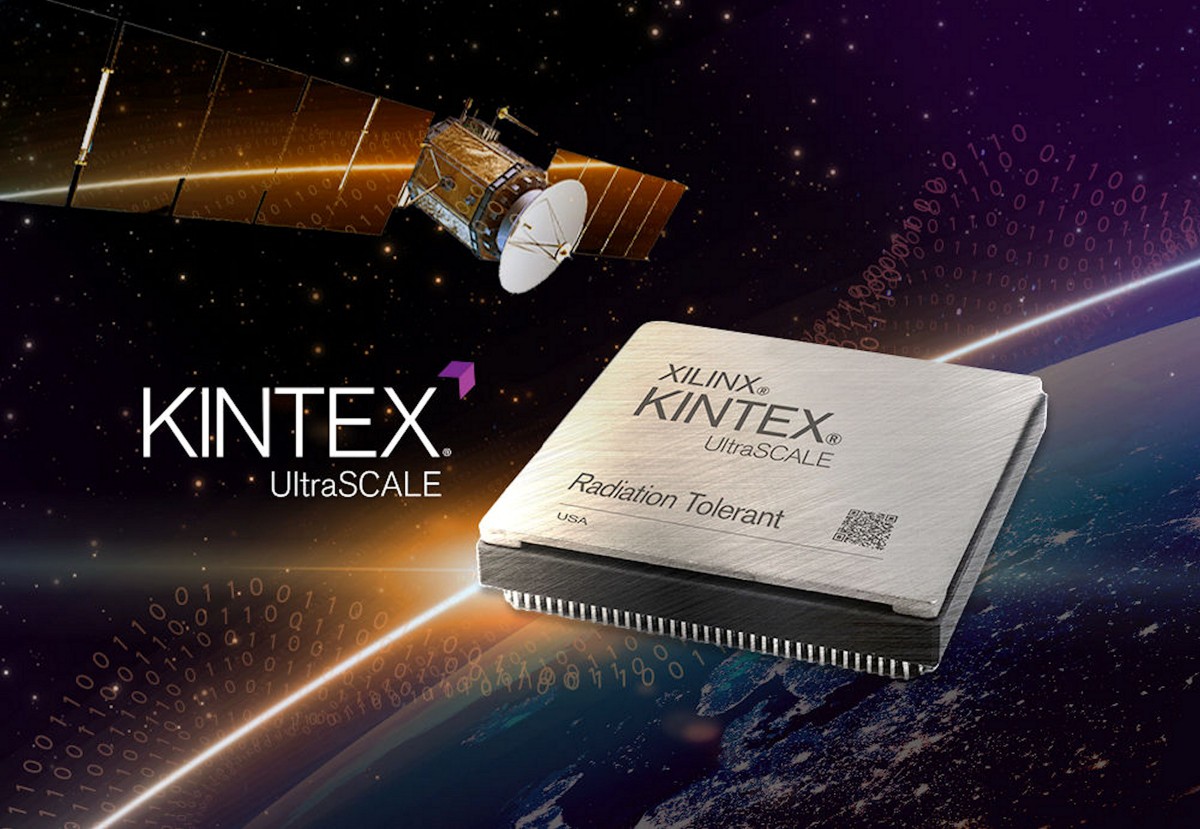Xilinx has introduced what it says is the industry’s first 20-nanometer (nm) space-grade FPGA, delivering full radiation tolerance and ultra-high throughput and bandwidth performance for satellite and space applications. The new 20nm Radiation Tolerant (RT) Kintex® UltraScale™ XQRKU060 FPGA provides true unlimited on-orbit reconfiguration, over a10x increase in digital signal processing (DSP) performance – ideal for payload applications – and full radiation tolerance across all orbits.
The XQRKU060 also brings high performance machine learning (ML) to space for the first time. A diverse portfolio of ML development tools supporting industry standard frameworks, including TensorFlow and PyTorch, enable neural network inference acceleration for real-time on-board processing in space with a complete “process and analyze” solution. The XQRKU060’s dense, power-efficient compute with scalable precision and large on-chip memory, provides 5.7 tera operations per second (TOPs) of peak INT8 performance optimized for deep learning, a nearly 25X increase compared to the prior generation.
Building on Xilinx’s space heritage and highly successful 65nm space-grade devices, the launch of the first 20nm part for space applications advances the space industry by three process node generations. It delivers a significant reduction in size, weight and power, and is engineered with robust radiation tolerant features. The XQRKU060 provides customers with a space-resilient device equipped to handle both short and long duration missions in harsh space environments.
“With our extensive history in developing leading-edge, radiation tolerant technology and deploying this in reliable space-grade solutions, Xilinx continues its lead with the launch of the world’s most advanced process node for space,” said Minal Sawant, space systems architect, Aerospace and Defense Vertical Marketing, at Xilinx. “The 20nm RT Kintex UltraScale FPGA is breaking industry standards and setting a new benchmark for meeting the high compute requirements of high bandwidth payloads, space exploration and research missions.”
Reconfigurable Processing
The XQRKU060 is the industry’s only true unlimited on-orbit reconfigurable solution. The on-orbit reconfiguration capabilities, together with real-time on-board processing and ML acceleration, allows satellites to update in real-time, deliver video-on-demand, and perform compute “on-the-fly” to process complex algorithms. The ML capabilities are suitable to a variety of problems spanning scientific analysis, object detection, and image classification – such as cloud detection – enabling improved processing efficiency and reduced decision latency both in space and on the ground. As protocols and applications progressively change, the adaptive compute architecture of the XQRKU060 allows unlimited on-orbit reconfiguration to enable customers to perform last-minute product updates prior to launch, as well as after it has been deployed in orbit.
Performance and Resiliency for Space
The XQRKU060 offers rich DSP capabilities optimized for dense power-efficient compute. It is equipped with 2,760 UltraScale DSP slices and provides up to 1.6 TeraMACs of signal processing compute, more than a 10X increase compared to the prior generation, as well as dramatic efficiency gains for floating point computations. The increased compute capability in space is paired with massive I/O bandwidth from 32 high-speed transceivers (SerDes) that can run up to 12.5Gbps to deliver 400Gbps aggregate bandwidth.
“SEAKR® Engineering, Inc. has collaborated with Xilinx for 15 years to consistently achieve challenging mission objectives for advanced space communications applications,” said Paul Rutt, CTO at SEAKR. “We have baselined Xilinx’s 20nm Kintex UltraScale FPGAs with 12.5 Gbps SerDes links enabling high-throughput, flexible and reconfigurable modulation, demodulation, channelization and routing capability in our newest advanced RF Reconfigurable processor, Wolverine. The Processor leverages the 10x increase in DSP compute capability for direct RF Sampling compared to prior generation systems.”
The XQRKU060 also features robust 40x40mm ceramic packaging capable of withstanding vibrations and handling during launch as well as radiation effects in harsh orbit environments. The architecture features an innovative design for single event effects (SEE) mitigation thereby meeting the industry requirements for all orbits, including low earth orbit (LEO), medium earth orbit (MEO), geosynchronous orbit (GEO), and deep space missions.
Development Tools
The XQRKU060 brings a new, simplified development environment with the Xilinx® Vivado® Design Suite. The redesigned routing architecture provides extensive routing capacity to resolve common industry bottleneck challenges. Programming with the Vivado Design Suite helps to eliminate routing congestion, allowing more than 90 percent of the device to be used without any performance degradation. With Vivado, system designers and radiation teams can maximize productivity and reduce development time, helping to enable aggressive launch schedules.
Additionally, the Vitis™ unified software platform provides support for embedded software development on the Triple Modular Redundant (TMR)-capable MicroBlaze™ soft processor. Future extensions will add support for Vitis™ AI, the Xilinx unified software platform for AI inference on Xilinx devices and production cards.
A robust partner ecosystem of compatible solutions for the XQRKU060 are available today. Ecosystem partner solutions offer an array of assets for customers to accelerate their space-application designs, ranging from prototyping boards, space-qualified power, memory and configuration solutions, and single event upsets (SEU) mitigation tools and IP.




